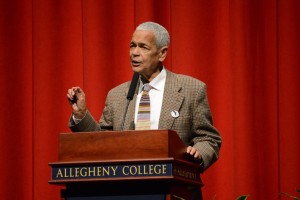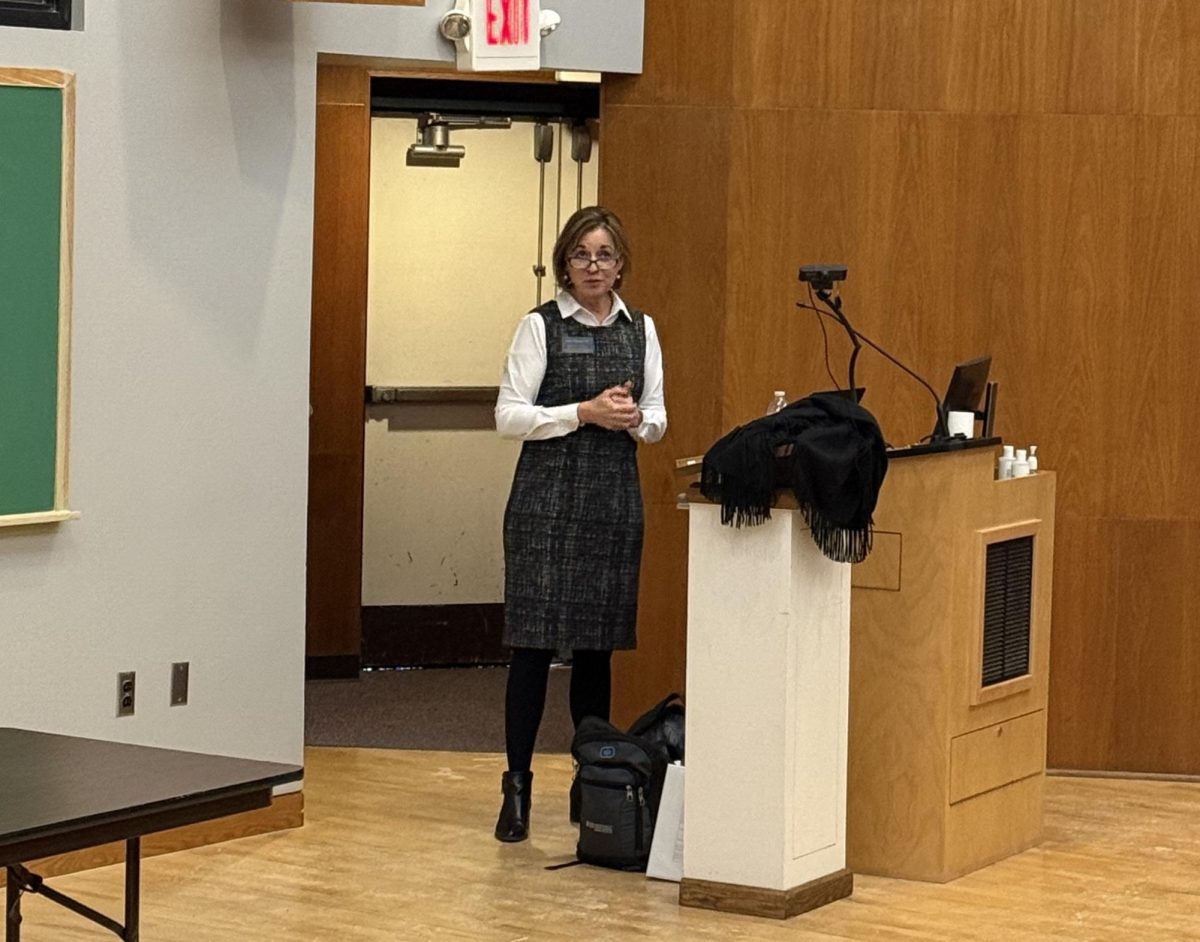By ANGELA MAURONI
Junior Editor
On Nov. 15, Julian Bond returned to Allegheny for the fourth time to act as the keynote speaker for the celebration of the upcoming 50th anniversary of the Civil Rights Act.
“It is not only what Mr. Bond has to say that should inspire us: it is who he is, someone who began his work to change a nation’s discriminatory attitudes and laws when he was the same age as many of you – and he is someone who has continued that momentous journey with passion and integrity and an unswerving commitment to social justice for all,” said President Mullen in an email sent out to the student body the day before the event.
Bond’s first visit was in 1970 to participate in the College’s speaker series, and his second and third were in 1976 and 1981 after being invited by the Association of Black Collegians.
During his most recent visit, Bond remembered some of the most significant events of the 1960s Civil Rights movement.
His discussion began with Rosa Parks taking a seat on the bus and refusing to move, sparking the Montgomery Bus Boycott in Alabama. He went on to admire of the children in Little Rock, Ark., who faced intense harassment and threats when they integrated with white children after the Brown v. Board of Education of Topeka, Kans. case.
The children of Little Rock were particularly inspiring to Bond in his journey to becoming a prominent Civil Rights leader.
Finally, he mentioned the formation of the National Association for the Advancement of Colored People, of which he eventually became Chair Emeritus.
Connecting modern issues with his experiences in the Civil Rights Movement, he also spoke of present day issues that are as evident now as in the 1960s, the second reconstruction, such as the gross distribution of wealth between blacks and whites, unequal infant mortality rates, imprisonment rates, homicide rates, life expectancy and more.
Despite the fact that acts and bills have been passed to defend minorities and civil rights, Bond said we have not done enough.
“Jim Crow may be dead, but racism is not,” Bond said.
According to Bond, studies show that 40 percent of white southern males are still confederate sympathizers. He went on to say, “We can’t forget that King stood before and with thousands.”
Once called a living legend by the Library of Congress, Bond began his activism for Civil Rights when he was still a student in college.
He helped found the Committee on Appeal for human rights in 1960. In Atlanta, he organized sit-ins and non-violent protests against segregation in parks, restaurants and theaters.
Then, in North Carolina in 1960, he helped to form the Student Nonviolent Coordinating Committee.
Although Bond is best known for his election to the Georgia House of Representatives in 1965, he was not allowed to take his seat in the House because of his opposition to the Vietnam war.
Bond was a political ally of Martin Luther King Jr.’s, and King organized a protest for Bond. The case was taken the whole way to the Supreme Court, where the judges unanimously voted in Bond’s favor, and Bond took his seat in the House in 1967.
In 1968, Bond became the first African-American to be nominated for Vice President. He was forced to withdraw from the ballot, however, because he was not old enough by constitutional guidelines to serve.
After serving for 11 years as Chair of the NAACP, he became Chair Emeritus. Bond has received 25 honorary degrees and has published “A Time to Speak, A Time to Act,” and a collection of poems.
Bond said that it hits him emotionally when progress is made. When asked about a post-racial society, Bond admitted that he cried when Obama was elected.
He addressed the issue of racism that some conservative Republicans have as well, and argued that Republicans were once for Civil Rights, and are only now hostile to them.
Bond believes that Republicans must be more welcoming, but he believes that the party can grow.
Bond said that over years, he has seen many people rise up to the fight for equality.
“The bodies of those who fought paved the way for the steps of others,” Bond said.

Famous civil rights activist Julian Bond returned for his forth visit to Allegheny on Nov. 15. He spoke to student, alumni, faculty and members of the community at Shafer auditorium as part of the year of Civil Rights. He discussed important moments in the equal rights movement and how social inequality continues in the world today. After speaking for forty-five minutes he participated in a Q&A with the audience.





